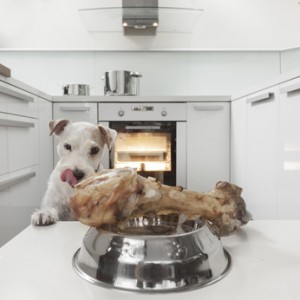Can I Really Make My Own Dog Food?

Advantages of Homemade Dog Food
The trend toward homemade dog food has been rising in popularity over the past ten years as horror stories of commercial dog foods spread. Pet food recalls always seem to spur a renewed interest in homemade dog food, but these are not the only reasons to make the switch – there are many advantages associated with making your own dog food. Some of these advantages include:
- Gives you control over your dog’s diet
- Allows you to customize the ingredients to your dog’s preference/needs
- Food is free from artificial ingredient and preservatives
- Made with fresh, wholesome ingredients of the highest quality
- Relatively quick and easy to prepare at home
- Reduces the risk of food allergies and intolerance
Challenges of Homemade Dog Food
The most important thing you need to realize in making your own dog food is that you must provide a balance of certain nutrients – this task may be more difficult than you realize. A study of 200 homemade dog food recipes that nearly 95% were lacking in at least one essential nutrient while over 80% had multiple nutritional deficiencies. One 9 out of 200 recipes provides complete and balanced nutrition. Other challenges associated with making homemade dog food may include:
- Increased cost of commercial formulas
- Reduced shelf-life – must make the food often
- Risk of food-borne illness if raw foods aren’t handled properly
- Dietary supplementation may be required
- May take a significant amount of time to make the food
Important Tips to Follow
If you have your heart set on making your own homemade dog food, follow some of these simple tips:
- Use only recipes approved by a veterinary nutritionist – don’t trust the internet
- Have your dog checked by a vet at least twice a year
- Keep a close eye on your dog’s weight to make sure he’s getting adequate nutrition
- Talk to your veterinarian about the supplements your dog may need
- Follow all food safety protocols in handling and preparing your dog’s food
Ultimately, it is your choice what type of food you give to your dog. Keep in mind, however, that the quality of the food will have a significant impact on your dog’s health. If you are interested in making your own dog food, just be sure to use high-quality ingredients in a combination that will meet your dog’s nutritional needs.






